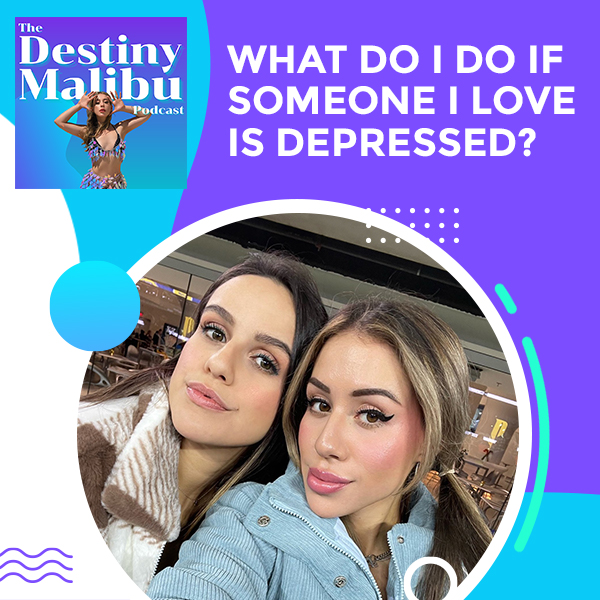
by Destiny Malibu | Feb 3, 2023 | Podcast
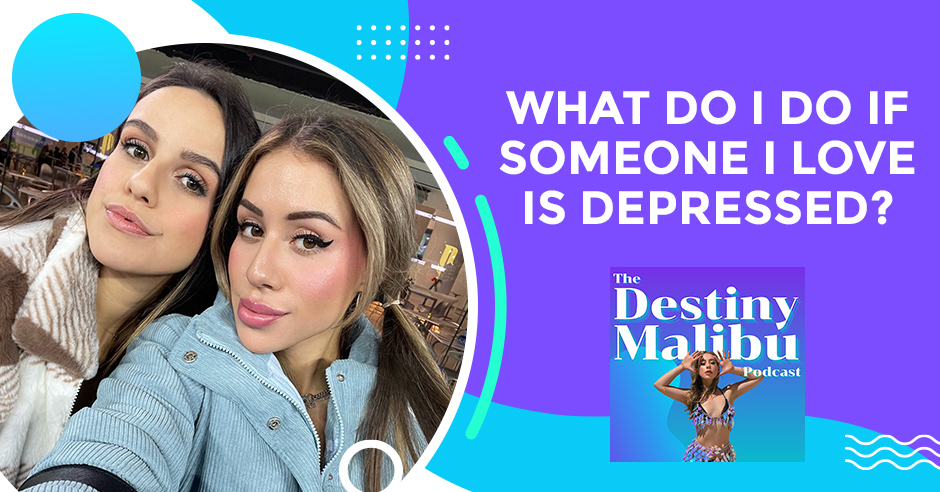
Have you or someone you know ever been extremely negative and/or depressed? Have you ever felt confused about what to say or how to act when you or someone you know can’t seem to get out of a funk? In today’s episode of the “Destiny Malibu Podcast,” Destiny Malibu and DJ Dezzee discuss exactly what to do in this situation. This is a beautiful episode that can encourage self-reflection, improved relationships, and a better understanding of one another. Welcome to the angel squad community!
—
Listen to the podcast here
What Do I Do If Someone I Love Is Depressed?
What is going on, everybody? It’s Destiny Malibu and my co-host DJ Dezzee. We are live from the Virgin Hotels Las Vegas. We are so excited to be back on property in Las Vegas at the Virgin Hotels and doing this live on location. It is so much fun.
It’s a blast. We get to see people walking by and we have a good time here.
If you are new to our show, this is a mental health–focused show where we talk about everything self-development and mental health. We’re a community of people who want to grow and have a growth mindset. Every single day, we want to get better. That’s why we’re here. On our topic, we are going to be addressing a question from a fan, which is exciting.
If you have any questions like this, you can go to AskDestinyMalibu.com and submit your little voice recording memo, and we can address your questions in one of our future episodes.
We’re not going to say the name of who it’s from. We’re going to keep things anonymous, so you guys don’t have to worry about us playing your question on the show or your name. We’ll keep it anonymous unless you specifically state it’s okay. Basically, this person asked, “How do I deal with friends if they are being extremely negative or negative toward you? Do you keep being their friend or do you start creating distance between yourself and them? What do you do in that situation?”
This is a very touchy question because I feel like this relates to the story of every person who struggles with mental health. A lot of people who struggle with mental health often feel like they’re a burden. That can often make the condition way worse. As a friend, how can you be there for someone while simultaneously, not letting what they’re going through also bring you down? How do you find that balance?
In previous episodes, we talked about empathy and sympathy.
Empathy, sympathy, compassion, and relating to people. I’m glad you brought that up. We talked about in another episode the importance of empathy versus sympathy. Empathy is allowing yourself to feel what the other person is feeling. Sympathy is basically not allowing yourself to feel the emotion, but feeling sorry for someone.
In the case of someone who has emotionally drained themselves, you can’t put someone else’s life vest on before you put yours on. If you’re running on empty or your oxygen tank is low, and you are trying to help someone else first, what’s going to happen to you? You’re not going to make it if you’re on empty. I think in the situation of somebody who is emotionally maxed out and you’re a very naturally empathetic person, you don’t want to drain yourself to the point of zero.
I struggle with that too. I am a very empathetic person and if I allowed myself that, I can get drained easily. Sometimes I have a hard time putting a limit on where I can listen to other people’s problems as well as my own. Sometimes we can think that we’re invincible and we can listen to as many people’s problems as possible and still be okay.
I think it’s important to be real with yourself and understand like this person who asked this question. If you are feeling drained and you’re feeling like, “I don’t emotionally have the space to deal with myself and be there for you during this hard time,” it’s a dance because you want to be there for your friend, but you also don’t want to neglect yourself. It’s a dance of finding the balance of being there for your friend while also staying true to yourself and understanding what your own limits are.
It’s super important to know your limits because you need to know your limits and realize that you can set those boundaries for yourself and for your friend in a kind way. Something that I like to tell myself, which is helpful in these kinds of stressful situations, is to deal with it with love, joy, peace, patience, kindness, goodness, gentleness, faithfulness, and self-control.
When you use those words and when you’re trying to work through a problem with someone, doing it out of love and being patient with the other person is so important, especially if you care about this person. They’re a best friend or a family member. If you’re not able to handle the issue on your own anymore or you’re maxed out, have a heart-to-heart and be like, “I need to tell you something that is affecting me.”
I know for me, when I was working, I was having to deal with all these little problems all the time. My boyfriend at the time, at the end of every day, I would vent to him for 10 to 15 minutes, probably for about two weeks every day. Finally, he’s like. “I’m sorry you had a bad day, but I don’t want to hear about it anymore.” It feels harsh but he was doing it because it wasn’t something that he wanted to deal with, which is okay because I was doing it every day.
I was over-complaining. Realizing that I was over-complaining, I dialed it back. It was a lot of self-reflection. As a friend, when you go to someone, they may be a little hurt and they may react. You have to be ready to accept that because your friend is going to be hurt. I was thrown off guard because he was my boyfriend. I’m like, “It’s only 10 or 15 minutes. Why? I’m de-stressing. Why can’t I say this?”
A lot of us that go to work sometimes need to de-stress at the end of the day. Not all the time is it work-related. Sometimes there are other issues that people are dealing with on a regular basis where they need to talk to somebody. When you use one person all the time to complain to, then they’re going to start viewing you as a complainer. As the friend who’s complaining, me being that one in that situation, I learned. I was like, “Because I love my boyfriend, I’m going to dial back my complaining a little bit and find other ways to decompress at the end of my day.”
There was a time in my life when I was struggling with my mental health, and it’s not a linear thing. There are some days or weeks where it’s tough, and then some weeks where I’m feeling on top of the moon and feeling great. There was a time in my life when I knew that I was in a very negative mind space. I was seeing through a lens of negativity.
There was a time in my life when I was really depressed when I felt that way. I did feel guilty and a burden because when I was around people, I knew I wasn’t adding to the room. I was not in a great mood. I had a tendency in the past to self-isolate because I didn’t want to bring other people down, which is also dangerous for somebody struggling with their health. You think isolation is going to help, but a lot of times it makes things worse.
My suggestion for this delicate situation is communication and setting boundaries. If you are the person who knows and if you’re able to self-reflect and be like, “I have been seeing negative things lately,” maybe take a moment to reflect and ask yourself, “Should I see a therapist?” That is literally what a therapist is for. To listen to you, and then to also help you reframe to a more positive lens. If you’re that person like I was at one point, “Do I need to see a therapist or one that really helps me?” I realized a while ago that not everybody does have the emotional capacity to listen to what is stressing me out.
What is a great alternative? Journaling is an amazing free alternative. It’s more fun in some sense to talk to a real human but at the same time, when you get into journaling, you can say absolutely anything you want and just get it all out there. Sometimes that is such a relieving feeling. It’s just you and a piece of paper, or you and the notes app on your phone.
You don’t have to feel bad about hurting anyone’s feelings.
You just let it all out. That can also be a good way to relieve that stress. If you’re the person on the other end or somebody who is dealing with somebody who is struggling in that negative mind space, my suggestion would be to express to them in a very gentle way, “I love you so much, but I personally am also emotionally taxed right now. I can only take on so many additional emotions. I want to be there for you as your friend and be a shoulder to lean on. Would you be okay and comfortable that if there’s something negative you want to talk about, can we set a time limit on how long we talk about that?”
“You can vent to me and say whatever you want for 10 or 15 minutes, and because you also love me as much as I love you as a friend, then for the rest of the day, we’d focus on trying to cheer each other up. We focus on trying to look through a positive lens to the best of our ability.” You’re setting a boundary as a friend.
Depending on how this person reacts, that’s out of your control, but you are being true to yourself in saying, “I love you. I want to be there for you.” I feel some people might take that the wrong way if you suggest therapy, so maybe just send them this video. If you’re like, “Maybe you need to see a therapist,” that might make someone mad, but it’s not a negative thing.
Therapy is a beautiful thing. It helped me so much. I know it would help so many other people. It’s finding that balance of being able to communicate and set your boundaries of what you are comfortable with, and what the other person is comfortable with, and finding a happy medium. If you’re the person who’s venting, you’re realizing, “This is negatively affecting the people I love. How can I change how I’m handling the stress in my life?”
You then turn to a therapist or journaling. That can be life-changing. It can improve not only your life but the lives of people around you too. If you’re on the other end where you are the person listening, you are still being a good friend by listening, but now you’re just saying, “As a boundary for myself, can we put a time limit on this? I also can’t help you if I end up down as well.”
Birds of the same feather flock together.
You have to put your life vest on first before you put someone else’s on. It’s the first thing they tell you when you’re on an airplane. The flight attendants always tell you to put your life vest on first before you start helping people because you can’t help people if you don’t make it. Everything in life is a dance and balance. You can’t get anywhere in life if you don’t communicate.
You want to be there for people, but also you need to be there for yourself. Make sure you’re acknowledging both sides of the coin and finding that balance. That would be my suggestion on that. If the person is a true friend, I think that they’ll understand and they’ll be like, “I get this. I don’t want to make you sad,” and vice versa if the other person is a true friend.
I also want to add to this that there are extremes like if you have a friend who’s not even willing to listen for ten minutes. Anytime you’re bringing anything up, they’re like, “No, don’t talk about anything negative.” That’s a little bit toxic because friendship should have some give and take. On the other way around, if the other person is always talking about negativity, that can also be toxic for the other friend.
Be mindful of each other and how our energy affects each other. To the best of your ability, try to always elevate the vibration in a room. If you’re at a point where you can’t elevate the vibration in a room, then it’s a good option to look into getting some therapy. Therapists can help you in a professional way to figure out what is that block in your life that’s stopping you from being in that mental space.
If you have any follow-up questions to this question that we answered, please go to AskDestinyMalibu.com and we will be happy to continue answering your questions. Any new questions, go to AskDestinyMalibu.com.
If you don’t know the mantra, you’re about to hear it. If you do know it, say it with us. This is the Destiny Malibu show mantra. We like to end every episode with it. If you hate me, I love you. If you love me, I love you even more. You are not alone. We are in this together. We love you guys so much, and we’ll see you in the next episode.
Important Links

by Destiny Malibu | Dec 2, 2022 | Podcast
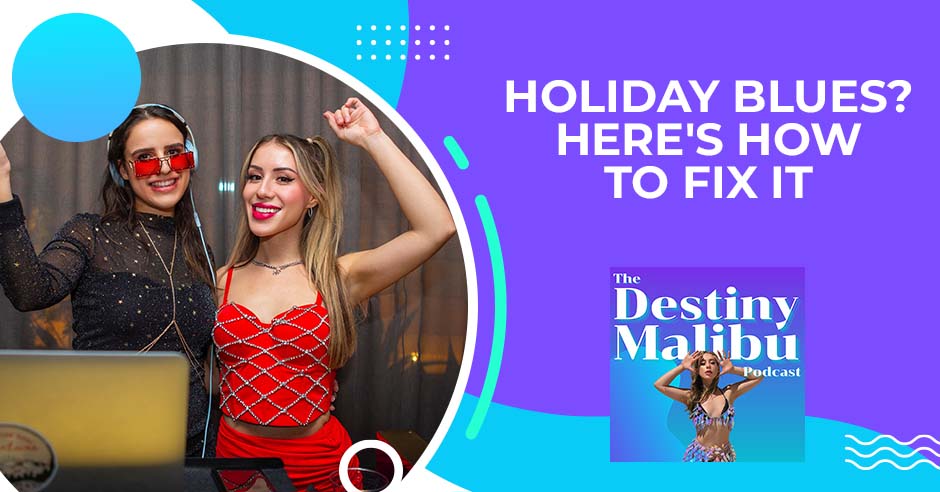
Studies show that the holiday season has typically a negative effect on mental health for a majority of people. Destiny Malibu and DJ Dezzee share their tips on how to beat the holiday blues.
—
Listen to the podcast here
Holiday Blues? Here’s How To Fix It
We are so excited to be talking about something very close to our hearts that we are very passionate about, which is mental health. We talked about How to Cope with Losing a Loved One. Now, we are going to talk about how to maintain quality mental health during the holiday season. Thanksgiving, Christmas, and New Year are very intense times when people typically are seeing their family and travel. There are a lot of different things going on at this time of the year. I want to read you guys a little quote, and this is from NAMI, which is a mental health organization.
It says that a NAMI study showed that 64% of people with mental illness report holidays make their conditions worse. That’s a very large percentage. It says that for many people, the holiday season is not always the most wonderful time of the year. It was said by NAMI Medical Director Ken Duckworth. For individuals and families coping with mental health challenges, the holiday season can be a lonely or stressful time filled with anxiety and/or depression.
If you are living with a mental health condition, stress can also contribute to worsening symptoms. We want to talk with you. Now that we are going into this holiday season, how can we help each other out, be there for each other, be there for ourselves, and work through our emotions during the holiday season? We have some tips for you. I know one thing I want to point out that’s going to be with Dezzee and me. We have pretty much celebrated every single Christmas with our Grandpa Doug.
I’m sure there are going to be a lot of emotions that are going to be coming up for this holiday season, and that there are a lot of you that are having different situations. Some people are far away from their families and are experiencing loneliness. You have the opposite situation where people are overwhelmed with the idea of seeing so much family. Maybe they have some complicated family dynamics, and it can create a lot of stress.
We want to talk with you about what we can do to cope with emotions and stressors during the holiday season. The first thing that we want to suggest to you is to recognize what your needs are and be gentle with yourself. Everybody has a different situation during the holiday season. It’s important to pause, check in with yourself, and ask yourself, “What are the trigger points that are causing me the most stress in my life now?”
For some people, that’s going to be the idea of being lonely in the holidays. How can we remedy that? If you are worried about being lonely during the holidays, maybe in advance, call up some friends and have a friend’s Thanksgiving or Christmas party. Those are fun. Dezzee and I have done quite a few of those, and they are a good time.
If you are someone who is overwhelmed with the idea of making a shopping list and having to get all of those shopping details done on your own, maybe delegate and ask someone else in your family or your friend group if they can help you with getting all of the things done on your checklist that you need to accomplish.
Grandma would always ask us and still asks us every year, “Can you make a list of things that you want so don’t have to think too much?”
Sometimes that is the best thing. I’m that person too. When it comes to holiday gift shopping, I like to buy people gifts that I know they want. Sometimes if I see something and I’m like, “This is so that person. I know they will love it,” I will make it a surprise. There is something about knowing in advance what someone wants. It also takes relief off of your head and like, “I want to make sure I get them something that they are going to like.” Either way can work, but it is nice to think in advance about what different things you could try to help yourself through your potential needs during the holidays and potential stressors.
Something else that is important to remember is to be thankful. I know that our family on my mom’s side, every year we all stand in a circle. We hold hands and tell each other what we are thankful for. Some of us have a short like, “I’m thankful for my family.” Some of us have a lot to be thankful for. It’s always nice to hear everyone’s thoughts on how they are thankful and what experiences they had that year that they are thankful for.
One of my favorite traditions of our family is we all stand in a circle and share something that we are thankful for. It’s such a beautiful experience to connect with everybody. That’s something that maybe if you haven’t done that, try it at your family get-together. Maybe there’s some tension in the room or some issues there. Maybe you haven’t seen each other in a while, and you want to feel connected. When you all go in around the room and say something that you are thankful for, by the end of it, when you finish that circle, you feel that your heart feels so warm.
You feel closer to everyone. You want to give a big group hug.
It’s a very bonding experience, and it’s one of my favorite traditions that we have as a family. I highly suggest that. At any time of our life, when we are struggling with mental health, especially during the holiday season, gratitude is genuinely a lifesaver. When you are feeling down and struggling with something, sometimes reframing your thoughts and focusing on something, even if it’s small that you are grateful for can kickstart your mind to help you move away from a direction that might not be so beneficial.
We say this all the time. If you are having a bad day, let yourself feel that. Let yourself cry. Let yourself feel what you need to feel, but remember after you have had that moment of expressing that part of your emotions to then move over into gratitude to the best of your ability. Even if you are not feeling it, you are feeling down, or you are not feeling grateful for anything, do me a favor and still make a list.
Set a boundary for yourself and give yourself a certain amount of time to be okay, but focus on something positive, whether it’s having water to drink and food to eat, a roof over your head, or a hand to hold.
Speaking of boundaries, that’s a good way to bring up another tip that we have for you. For a lot of people, sometimes the holiday season can be stressful because family dynamics can be complicated. Maybe you are going to see a relative or someone that you know bring up a little bit of stress in your soul. Something I want to remind you that you can do is you can set boundaries.
Even during the holiday season, boundaries are such a beautiful way to exercise self-love and compassion and be aware within yourself of what you can handle and cannot handle. Sometimes when you are already stressed and overwhelmed, the last thing you need is to have an argument about something that happened several years ago at a family reunion. Sometimes that’s not the best way to spend the holidays, probably not ever the best way to spend the holidays.
We want to remind you that if you are in a situation where you are feeling uncomfortable when you know something is being brought up that you are not comfortable speaking about, you have the power and the ability to gently and kindly say, “I love you so much, but I’d love it if, during this holiday season, we could talk about something else because I don’t want this to cause an issue. I love you so much and I want to enjoy the evening, night, or morning, whatever it is.” It’s okay to make those little requests and say them in a kind way. Remember that how people act is a reflection of themselves and not you.
It is going to be what you expect from other people in this season.
Regardless of how somebody reacts or what somebody says, try to remind yourself that it’s not personal because whatever is coming out of someone’s mouth is a reflection of something that they probably need to work on.
Don’t forget to set those boundaries with them in the most loving possible way possible. As I was saying, set your expectations from your family members or even maybe the party that you are planning. If you have everyone over to your house for Thanksgiving, Christmas, or the holidays, sometimes we put so much pressure on ourselves that it has to be perfect. You got to have all the perfect decorations and food, “I have all the perfect gifts for everybody.” It’s not about being perfect. It’s about enjoying the moment, loving each other, and being patient with each other. Remember that we all make mistakes, it’s okay, and we got to be there for each other. It’s the holiday season. It’s supposed to be a time of happiness and love.
As someone myself who struggles with perfectionism, I can tell you that is a recipe for disaster because the reality is none of us are perfect. No situation is perfect. If you are striving for perfection, you will always be let down because perfection doesn’t exist. We were all imperfectly perfect. It’s okay to have an event or a situation go a little bit differently than you expected. It’s important during this season to be able to go with the flow and be okay when something doesn’t go exactly the way you planned.
I don’t know if this has happened to us, but I feel like we have burned some food during the holidays.
You read my mind. I was going to say that, even if you burned the turkey, which I feel that’s happened to us probably. I don’t remember if it was for Thanksgiving, but I remember one time there was something going on and everything went wrong. The green beans burned. The turkey fell on the floor. Something crazy happened.
We ended up going out for a Thanksgiving dinner.
I was in Malibu. I don’t remember exactly, but I’m pretty sure it was during the holiday season. We all shed a tear because it was like, “What the heck is going on?” We laughed about it and decided to turn it into a bonding moment. We ended up going out to eat. It was a great holiday. It’s okay if everything doesn’t go exactly the way you planned.
Another thing that we want to remind you is that something that people sometimes struggle with during the holiday season is sometimes budget because there’s so much money being spent on gifts, family get-togethers, and all this stuff. Setting a budget can be something that extremely can relieve stress because you are like, “I’m spending this X amount of money on these gifts and these decorations on this.” That way, at the end of the year, you are not like, “I went way over my budget,” and get mad at yourself or however that goes. It is important to set a budget and be aware of what it is that you want to spend money on in advance because that is something that stresses out a lot of people during the holidays.
If you have a chance to set aside a little bit of money throughout the year, when you get to the end of the year, then you are like, “I have saved all this money so I have this money. I can also spend this much more.” It builds on itself. Maybe you didn’t get a chance to do that this 2022, but you can start planning for 2023.
In addition, sometimes we put an over-emphasis on spending money on expensive things for the holidays, gifts, and things like that. Sometimes the best gifts are inexpensive. It’s quality time. Some gifts that I love to give are photographs. I love to receive that gift also more than a lot of things because it’s a memory. It’s something special. It’s something handwritten.
It’s sometimes the sentimental value over the monetary value that hits home. I want to remind you that the holiday season doesn’t have to be super expensive. If you want to go and ball out, let’s go for it, but it doesn’t have to be that way either. Sometimes spending time with each other is the best gift that you could ever give. We love you so much, guys, and we hope that these tips help you through this holiday season. We are so excited to be live from the Virgin Hotels Las Vegas. We hope that you come back for more episodes.
If you have any questions, you can go to AskDestinyMalibu.com. You can submit your questions for some upcoming episodes that we are going to have and we’ll go ahead and address some of those questions on those future episodes.
We have been getting a lot of questions in there, so we will be addressing those very soon. I’m excited to do that. We love you folks so much, and we will see you on the next episode. Love you. Happy holidays.
Important Links
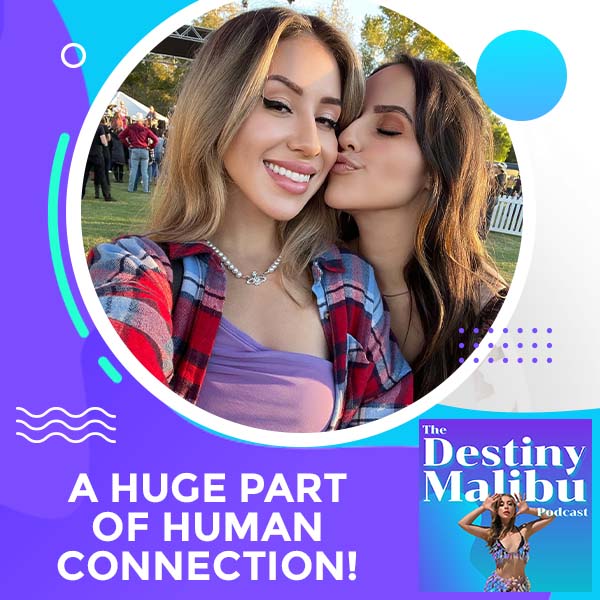
by Destiny Malibu | Nov 4, 2022 | Podcast

After diving into the Seven Pillars of Mental Health for the last several weeks, today, Destiny explores a different topic. A VERY important topic!
She talks about a quality that’s a crucial part of human connection. A quality that’s desperately needed, but sadly lacking, in our society. A quality that helps you understand people on a deeper level. A quality that gives you amazing mental, emotional and physical health benefits!
So what is it? And how do you develop it and live it out? Tune in to today’s episode of The Destiny Malibu Podcast!
—
Listen to the podcast here
A HUGE Part Of Human Connection!
We are so excited to be partnering with the Virgin Hotels Las Vegas, and talking about a topic that we feel a lot of times needs a little more love and is not talked about a lot, especially in Las Vegas, which is a party city.
We’re all about having fun, going out, and doing all those things.
However, we also want to make sure that you guys are feeling good mentally and emotionally. We’re here to be your friends and talk about some mental health topics with you guys and how we can build a community together of people who are focused on becoming the best version of themselves. We’ve been talking about the seven pillars of mental health, which is something that I made that has helped me through my mental health struggles and journey.
Those pillars that we’ve talked about, if you guys haven’t heard them yet, you can go back to previous episodes. We are diving into a new section because we’ve talked about all of our seven pillars of mental health. In this episode, we are sifting into a new topic, which is called empathy and the importance of empathy. That’s what we’re going to be discussing. Empathy is a crucial part of human connection, feeling connected to the people around you and understanding people. It’s the ability to step into someone else’s shoes and imagine what they’re going through. A lot of people are struggling out there and are keeping it private and not telling anybody.
They’re suppressing it and holding it in. They are building it up until one day, the bubble is over. We don’t want any of you to go through that. We’re trying to let you know now how to be empathetic with each other.
How to be empathetic, how to be a good listener, how to check in on your friends and make sure that they’re doing good. Make sure that they’re feeling okay because a lot of people were struggling with their mental health during the pandemic. Now, that things are opening back up, we’re so happy. We’re at the Virgin Hotels Las Vegas, and we want to be your online friends and remind you guys of the importance of empathy.
We are going to be talking about the three different types of empathy. I thought this was very interesting. There is cognitive empathy, emotional empathy, and also compassionate empathy. Cognitive empathy is the ability to understand what someone is going through. Someone tells you a story. Maybe they were late to work, got a flat tire, or something crazy happened. They tell you about it and you’re like, “I understand how that could be a difficult situation.”
When you understand, you have to sit there and listen, right?
Yes. Listening is a huge part of understanding. Dezzee is an extremely good listener. She listens to me. Babble away nonstop.
I do. She’s like, “Are you listening?” I’m like, “Yes, I am,” and I say back whatever it is that she’s saying.
She’s a fantastic listener. I love people and I love communication. I enjoy asking people how they’re doing and diving deep into those topics. Cognitive empathy is understanding. We also have emotional empathy, and this is when you are able to physically feel what this person is feeling. I’m sure a lot of you guys have experienced this. Sometimes you see someone crying and your eyes start tearing up.
That’s mirroring, but it’s also emotional empathy when you’re able to see someone in pain or somebody struggling and feel that physically in your body. Also, feel the sensation of what that person might be going through. This is emotional empathy. We have the third one, which is compassionate empathy and it’s a combination of cognitive and emotional empathy. Compassionate empathy is the combination of being able to understand and feel what the person is going through.
That normally comes around when you’ve also experienced what that person has gone through. Is that right?
Yes. It’s important to exercise this muscle of compassionate empathy because it’s a huge part of the human connection of being able to understand what someone is going through. Something that I also want to highlight is the difference between empathy and sympathy because I think that’s easy to get confused too. What’s the difference between empathy and sympathy? Sympathy essentially is the ability to feel sorry for someone, to pity someone, but to separate yourself emotionally from what they are going through. You’re feeling sorry for them and pitying them, but you’re not allowing yourself to physically feel any of those sad emotions.
You’re keeping it at an arm’s distance.
You’re like, “I’m so sorry for you. That sounds sad,” but you’re not emotionally connecting. Empathy is the ability to see somebody and emotionally connect. You sit there with them and say, “I understand what you’re feeling. I feel your pain.” Maybe you’ve been through something similar. This is the difference between empathy and sympathy, which is important to highlight how beautiful it is to be able to empathize with someone. It’s because when you’re sympathizing with someone, you’re removed from it. You’re like, “I hope that gets better. I feel sorry for you,” but you’re not having that emotional connection with the person.
You’re probably not listening. You’re like, “I don’t understand what you’re talking about and I’m not going to listen.”
It’s important to remember to ask people how they’re doing. Ask them what’s going on in their life and how they’re feeling emotionally, and then be able to sit there and exercise the ability to truly empathize with people. This is a huge part of human connection. It can help you make your relationships so beautiful, build them up, and build those strong connections with people, which at the end of the day, we all want to have those strong connections with people.
As mom told us when we were little is that we have two ears and one mouth. We should be listening twice as much as we talk.
That’s a good highlight and it’s true. We got to make sure we are listening to each other and checking on each other. Also, practicing empathy is not only beneficial for the people around you, but it’s beneficial for you. Studies show that it benefits your health so you are less stressed and you have less negativity in your life. It improves communication skills in your workplace. It improves the connections you have with your fellow coworkers. It transcends personal relationships to a totally different level.
Remember that when you’re going out into the world or when you’re hanging out with people that you are showing empathy for the people you care about and people that you don’t know that well. Sometimes, I’m walking around and I’ve seen people crying in a hallway or something. I always stop and I’m like, “Are you okay?” Sometimes people don’t want to talk. That’s fine. Sometimes people want a hug. They want to talk. It’s not that all of us have the time to do that, but it’s such a beautiful thing to connect with people in that way.
A lot of times, especially with social media and stuff, we all seem to be perfectly happy all the time. It’s because we’re posting everything that’s going good. However, a lot of us are going through hard times. Remember to check in on your loved ones and exercise your empathy muscle. We love you guys so much and we’re so happy to be partnering with the Virgin Hotels Las Vegas, talking about mental health in a big party city and bringing light to this topic.
If you have any questions that you may want to ask Destiny that you want us to talk about in future episodes, you can go to AskDestinyMalibu.com and submit your questions there. Also, there is a free giveaway. Is that right, Destiny?
Yes, Dezzee. We are giving away a free weekend getaway to the Virgin Hotels Las Vegas. They have been so gracious to do this giveaway with us. You guys get to win a free hotel stay weekend getaway. All you have to do to enter this giveaway is subscribe to the show, rate the show and leave a review. You’re going to want to take a screenshot of your review before you hit send. You can email it to Contest@DestinyMalibu.com because it does take 48 hours for the review to go live. All you have to do is submit it. Review the show and send it to that email address and you could win a free weekend getaway and dinner with us.
We’d love to have dinner with you so make sure you do that. I think we’re going to end the show with our mantra.
If you don’t know the mantra yet, it is, “If you hate me, I love you. If you love me, I love you even more. You are not alone, and we are in this together.” We love you guys so much. Make sure you come back for the next episode.
Important Links
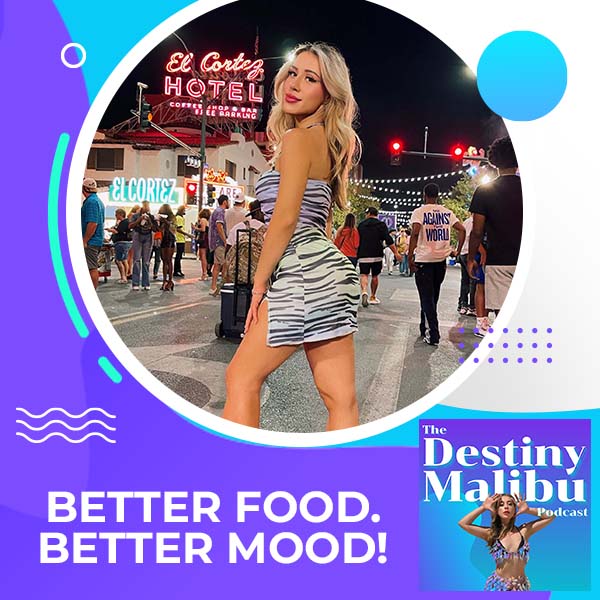
by Destiny Malibu | Nov 3, 2022 | Podcast
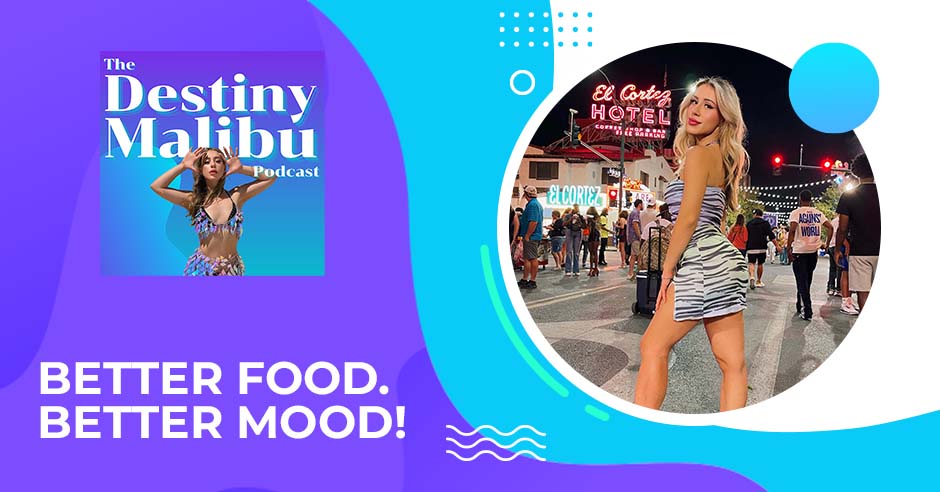
It’s strange but true—what you eat affects not just how you feel physically, but also how you feel emotionally and mentally. Indeed, food is a very important pillar of good mental health.
There’s a strong connection between your brain and your gut. According to a Harvard study, 90% of your serotonin receptors are located in your digestive tract. So doesn’t it make sense that the food you eat will affect your mood and your mental health?
When Destiny was younger, she had some pretty intense mental health struggles. She didn’t know it then, but she was also afflicted with lots of food sensitivities.
It turns out that the foods causing her physical problems were also hurting her mental health.
But now? She feels MUCH better! What did she do to experience such a remarkable turnaround? And what does she recommend you do?
She talks about it on today’s episode of the Destiny Malibu Podcast. Check it out here!
—
Listen to the podcast here
Better Food. Better Mood!
What’s going on, everybody? Welcome back to the show. It’s just going to be me because Dezzee is traveling in Florida, so everybody say, “I love you Dezzee and I miss you,” in the comment section. I know I’m missing her now but in this episode, we are going to be talking about another one of the seven pillars of mental health. We’ve talked about self-love, social life, purpose and exercise and now we are going to be talking about a very important pillar, which is food. Before we dive into this topic, I want to read you, folks, a quote from Harvard Health.
It says, “When we consider the connection between the brain and the gut, it’s important to know that 90% of serotonin receptors are located in the gut. In a relatively new field of nutritional psychiatry, we help patients understand how gut health and diet can positively or negatively affect their mood. When someone has been prescribed an antidepressant such as an SSRI, the most common side effects are gut related. Many people temporarily experience nausea or gastrointestinal problems. There’s anatomical and physiologic two-way communication between the gut and the brain via the vagus nerve. The gut-brain access offers us a greater understanding of the connection between diet and disease, including depression and anxiety.”
I have always been extremely fascinated by gut-brain access. Right there in the quote, you heard that 90% of our serotonin is produced in our gut. I’m sure you’ve heard the saying, “You are what you eat,” and that is such a true statement because when it comes to our mood, our mental health and in general, how we’re feeling, our energy levels and everything, what we’re eating affects how we’re going to feel physically but also emotionally.
That’s what we’ve been discovering more with new studies. They said the new field of nutritional psychiatry is starting to make some amazing discoveries. What happens is, in our guts, we have good and we have bad bacteria. There’s an ecosystem and a balance where the good bacteria should be overpopulating the bad.
What happens a lot of times is maybe we’re not sleeping as much, not being as careful with the health of our food choices and if that bad bacteria start to overpopulate the good and the ratio starts to get imbalanced. This is when we can start to see problems with our health. Not only physically but because it’s going to affect our mood because of the gut-brain access. The gut-brain axis is fascinating. I know I’ve experienced this before, if you’re nervous, maybe you get butterflies in your stomach or your stomach feels weird.
Conversely, if our emotions can affect our stomach and causes us to feel butterflies and nervousness and all of these types of things in the stomach, then also the opposite is true. If our gut is not balanced and the bad bacteria is overpopulating the good, that can also send signals to our brain and cause sad emotions. The gut-brain axis is fascinating to me. It’s important for us to make choices with our food that are going to help us thrive and be the best versions of ourselves physically and mentally.
I think the importance of food and what we’re eating a lot of times can get overlooked in the mental health sphere. Personally, when I was younger and I was struggling with my mental health, I didn’t know it at the time but I was struggling with a lot of food sensitivities and inflammation in the gut. Inflammation in general is one of the root causes of disease.
I didn’t realize that all of this inflammation going on with my gut because I was sensitive to the foods I was eating was also affecting my mental health. I know that everyone has a different version of eating and what feels good to them. It’s important to emphasize that I don’t believe there’s one size fits all for a way of eating.
Everybody’s different. It’s important to speak with your doctors, with your physicians and figure out what way of eating is healthiest for you and for your body and your body type. I tried a lot of different styles of eating to figure out what made me feel my best physically and emotionally, my mental clarity, my energy, my skin and all of those things.
I wanted to see what way of eating made me feel my best. After trying a lot of different styles of eating vegan and vegetarian, pescatarian and paleo and all of these different types of ways of eating, I found Dr. Gundry and Dr. Paul Saladino. Both of them have so much information and are incredibly intelligent men. I’ve learned a lot from them.
I’d say that the way I eat now is a combination of Dr. Gundry and Dr. Paul Saladino’s suggestions. For the most part, I focus on a whole foods-based diet. That’s what works for me and what that looks like for me is a lot of fruits, vegetables like spaghetti squash, zucchini, butternut squash, mushrooms, spinach, mixed greens, lots of fruits and lots of healthy fats like extra virgin olive oil and pasture-raised butter.
I do well with eating meat. I know not everybody eats meat and that’s totally personal. Tortillas out of cassava flour with water and olive, mix it together with cassava flour and cook them on the grill and put butter on them. That’s basically what I eat every single day and I feel good like that. My mental clarity is good. My skin improves so much. My energy improves so much.
I discovered that a few years ago I was living in a very high state of inflammation. As we talked about from Harvard Health, 90% of serotonin is made in your gut. If your whole body is inflamed, if your stomach is inflamed and that serotonin isn’t being produced properly, it can affect not only your physical health but your mental health too.
I found what works for me and I’m happy with it. I feel better than I’ve ever felt in my whole life, honestly, following this low inflammation way of eating. Though we all have different ideas of what the right menu looks like for us as individuals, we all can agree that and trying to grab more natural foods, more things like fruit and more things that come from the earth instinctively make more sense.
Let’s all try to get those fruits in, try to get those veggies in and make choices with our food with the mentality of how can I nourish my body? How can I give my body the best fuel, the most premium grade fuel to function at its highest level so I can live a long life, healthy life and energetic life? That’s what we want to do. I want to encourage you guys to make those healthy food choices and not forget that the food we eat has a direct impact on our mental health. I love you folks so much and I hope that you are able to incorporate this pillar into your life and pick foods that nourish your bodies.
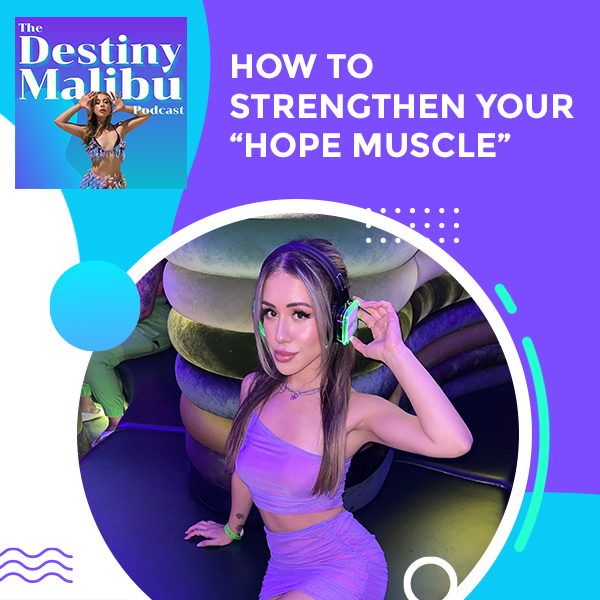
by Destiny Malibu | Oct 28, 2022 | Podcast
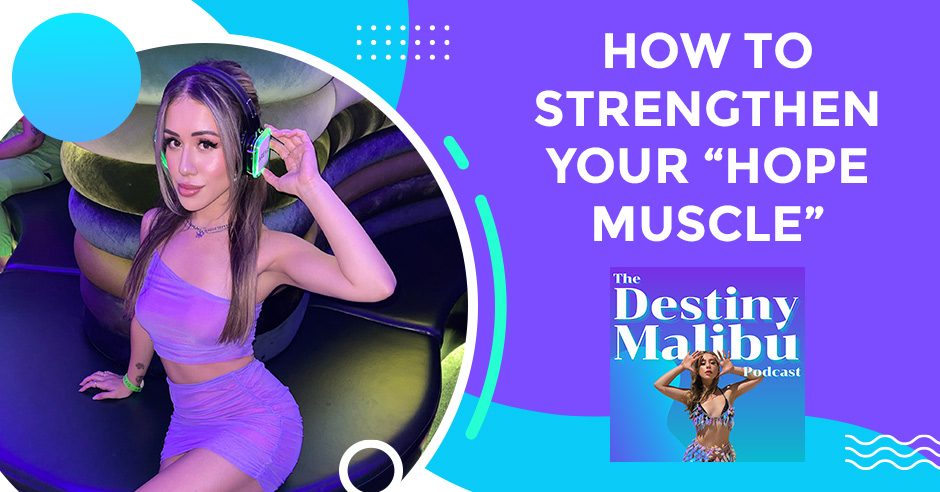
This one is critical to all of us. We need hope. In Destiny’s own experience, the times when her mental health was the worst were the times when she had no sense of hope.
Hope is critical in hard times. It’s something we can lean on. But here’s the thing… How do we get and stay hopeful, especially when times are tough? It’s one thing to tell someone “Have hope!” It’s quite another to have a sense of hope when you truly don’t feel like it.
Good news! In today’s episode of The Destiny Malibu Podcast, Destiny shares some practical tips to help you cultivate hope. Along the way, you’ll discover what hope is, and what it’s not. You’ll also find out about why you want to avoid “toxic positivity.” Sound interesting? Listen to today’s episode!
—
Listen to the podcast here
How To Strengthen Your “Hope Muscle”
If you are new to the show, this is a mental health-focused show. We talk a lot about mental health. Mental health is something that is close to my heart. I’ve had my own struggles with it. I’ve had friends who have struggled with it. It’s something that I feel like a lot of times is not talked about as much as it should be. Even though we are in Vegas and this is a party city and lots of fun things to do, we want to make sure you guys are doing well with your mental health as well.
We’ve been talking about the seven pillars of mental health, self-love, the importance of purpose or knowing what your purpose, social life, exercise, and food. In one of our episodes, we talked about therapy and its importance. Now, we are going to be talking about the seventh pillar. After all these episodes, we’re on the seventh pillar and that is hope.
Hope is something that is important to quality mental health. I’ve noticed in my own life, at times when I’ve been low, seeking professional help and not sure where to turn next, that was a time in my life when I had lost my sense of hope. Hope is a lot of times the pillar that holds us together during hard times and something that we can lean on.
What happens with a lot of people is when you lose sight of hope, then it causes you to get to a point where you’re hopeless and don’t know where to turn next. We want to share with you guys some practical tips on how you can cultivate hope, especially in the mental health sphere. You hear things like, “Stay hopeful,” and it’s like, “How do I do that?” We want to share with you guys some tips on how you can cultivate more hope in your life and not lose sight of that because it is so important to have quality mental health.
One of the things that you can do to strengthen your hope muscle if you want to call it, is to focus on your strengths in life. Every single person on earth has a strength. If you’re sitting there right now and thinking to yourself, “I don’t know what my strength is.” We are going to find out together. If you haven’t discovered it yet, you can always discover what your strengths are at any point in life. This crosses over to another pillar that we talked about, which is purpose.
We talked about another episode of figuring out your purpose and one of those ways to do that is figuring out what makes you tick. What are the hobbies you like to do? Whether it’s something creative or you’re a mathematical person or a teacher, There are so many areas to explore. “What am I good at? How can I give back to the world and how can I share that?”
We want to make sure that you guys are exploring what your strengths are and focusing on that because a lot of times in mental health, we can sometimes have a tendency to focus on what we’re not doing right. If you’re focusing on what you’re not doing right, you’re not going to feel too good. We need to be focusing on what our individual strengths are. I’m an artist and a musician. I love making music. That’s the way that I’m able to contribute back to the world. Desiree is a DJ and she has a lot of strengths.
I like to help everyone in any way I can. I’m a people pleaser and sometimes it gets the better of me and I have a hard time saying no, but I have gotten better at it. I’m hopeful that I can help every one of you as much as I can.
Another thing that we can do to cultivate hope is to practice gratitude. Gratitude is an important part of mental health. A lot of times, something that can help us if we’re having a bad day is to sit and make a list of all the things that we’re thankful for and physically write it down. There’s something about writing things down with a real pen and paper, which I feel like we don’t do a lot. I do this sometimes.
We’re on social media all the time and got carpal tunnel in our thumbs.
Writing things down and making a list of what you’re thankful for is so beneficial to our mental health. When you’re done writing a list, It can improve your mood. It seems so simple, but a lot of the things that improve our mental health are simple. It’s about appreciating the simple things in life.
It’s taking a moment to smell that cup of coffee or the roses in the morning.
It seems cliché, but honestly, your list could be like, “I’m so thankful for my cup of coffee, running water, and the people in my life.” Making a list like that can quickly shift your focus from everything going wrong in your life to everything going right.
It will lead you to that hopeful moment when things are going to get better.
That’s something I want to touch on too. Being hopeful and optimistic are two different things. Sometimes people think optimism is somebody who’ll blindly say, “Everything is great. The world is sunshine and roses. Nothing Is bad.” Being hopeful and understanding what hope is realizing and having a mindset of, “Even if something goes wrong in my life, I’m going to be okay because I am hopeful for the future. I’m hopeful for the next day.” That is something that we have to remember because there are a lot of people who talk about something called Toxic Positivity. I’m not sure if you’ve heard about that.
I’ve heard of it, but not too familiar.
I’ve heard a lot about it and it is people who are pushing being positive and suppressing emotions. When we’re talking about hope and the importance of hope, we’re not promoting toxic positivity. We want you guys to feel and express your emotions. We are human. There is nothing wrong with having a bad day.
We all have them. I do.
Me too. None of us are immune to that, but the important part is to recognize, “I’m having a bad day.” Let yourself cry it out if you need to and take a moment to do what you need to do to get those emotions out. Maybe go for a walk or go dancing. When we focus on hope, it is the ability to come from that negative space or dark place and come back into this concept of hope of, “I’m going to be okay.”
We don’t want you guys to suppress your emotions. We want you to feel them, but then we want you to set up a limit for yourself for a few hours and say, “I’m going to cry for an hour and listen to some sad Adele songs. I’m going to let myself feel this, but then after this hour’s done, I’m going to re-shift to my strengths and gratitude. I’m going to give this day the best that I can.” That’s an important one.
Another thing that we can do is sometimes limit media exposure. A lot of times nowadays, we’re scrolling so much online and getting fed so much information on a constant basis, especially with TikTok. One second, you’re seeing a puppy getting rescued and you’re like, “A puppy is getting rescued,” and then the next episode talking about the pandemic or something. All of these emotions that we’re feeling so quickly because of social media are not natural for us. There’s not a natural ebb and flow like when you watch a movie, there’s a building point for the stories, whereas now, we got 30 seconds for each reel and it’s all a different topic.
Our brains are overloaded. Sometimes limiting media exposure can be beneficial. I’ve done social media breaks before but it’s hard. It’s addicting. Scheduling that into your life, especially if you’re having a stressful day, sometimes getting off of social media or not turning on the news if you’re already stressed is something that’s going to improve your day. It help you to refocus and spend time with nature.
It helps you get back on that hopeful track.
A couple more ways we want to share with you guys of how you can cultivate more hope is by seeking inspiration from others and surrounding yourself with positive people. It’s surrounding yourself with people in your life that are going to add to your life.
They’re going to help you look for that silver lining in that negative situation.
I do have a song Silver Lining, so check that out. It’s important to surround yourself with people who are like-minded and want to improve and grow every single day because that’s the goal of what we want to do. That’s a good one. Also, helping others is a good way to cultivate hope in our lives and hope for another day. Desiree did some community service.
Me and my ex at the time, back in Tampa, Florida decided to make little lunches, beans, rice, and protein. We cooked for 4 or 5 hours and made all this food. We made twenty lunch meals and got the disposable paper plates, silverware, and napkins, and wrapped it all up into little baggies. We went around downtown Tampa and found people who were in the dark corners of the streets or wherever they were. We found them and we’re like, “Would you like a hot meal this morning?” They’re like, “That’s so nice of you.” We were able to give out all our lunches that day. It wasn’t for us, but we wanted to reach out, help others, share that love, and give that hope that, “Today is not the worst day because we’re going to bring you this lunch.”
That’s so nice. It’s so important to get involved with your community and look to help people who are in need. I’ve done some community service as well. It’s like connecting with people and connecting with the world and reminding each other that you’re not alone, which is something we say on this show a lot. You’re not alone and we’re all in this human experience.
All of us have bad days. Some of us are going through tough times, but we can be there for each other. Seeking inspiration from people who are also focused on sharing that kindness and love is helpful. We wanted to remind you that cultivating hope in your life is understanding that there’s no guarantee that things are going to go the way you want, but regardless of the outcome, you’re going to be okay.
Everything is going to be all right.
That’s what hope is. Hope for a better day. We want to share that with you and hope that you can incorporate this into your life. We love you so much. Our mantra, if you guys don’t know it already, it is, “If you hate me, I love you. If you love me, I love you even more. You are not alone and we are in this together.”
We want to remind you guys to enter the giveaway that we have going on with Virgin Hotels Las Vegas. We’re so thankful. All you have to do to enter the giveaway to get a free weekend at the Virgin Hotels Las Vegas is subscribe, rate the show, and leave a review. You’re going to want to take a screenshot of that review before you hit send. Email it to Contest@DestinyMalibu.com because it does take 48 hours for the review to go live. You could win a free getaway to Vegas.
Who doesn’t want that?
Come hang out with us. We hope you guys enter the contest and win. We love you so much and see you on the next episode.
Important Links











Recent Comments